Registration
You will receive an email confirming your registration.
IMGXYZ551IMGZYXJessica Mathews, president of the Carnegie Endowment for International Peace, began by welcoming Karen DeYoung, associate editor of the Washington Post and author of Soldier: The Life of Colin Powell, and David Rothkopf, Carnegie Endowment visiting scholar.
David Rothkopf began the discussion by highlighting the tendency for people to characterize Colin Powell as an individual that shares their own values. For instance, both Democrats and Republicans commonly believe that Powell is on their side of an issue. Rothkopf asked DeYoung what the most common misconceptions about Colin Powell are, hinting that Powell’s duplicity in the political arena led to significant misconceptions.
DeYoung responded that the general’s flexibility in working across party lines has been a component of his personality throughout his career—present even before his position was technically political. His cross-party alliances helped him to move forward objectives that he sought without being openly political because he was able to engage in important business behind closed doors. Because Powell has comfortably shifted company from democrats to republicans, some have called him an empty ideological vessel, but DeYoung argued this may not be a complete misconception.
Powell’s party convictions can be traced back to his friendships and strategic calculations about his ability to win political races—they do not appear to reflect a strong partisanship in any ideological sense. For instance, in 1995 when Powell declared he was a Republican it was primarily because he knew that as a Democrat he could not beat Clinton in a presidential race. He chose not to run because he realized the Republican Party would not nominate him because of his liberal social views. In the end he tried to quietly reform the party from the inside, a common theme in his approach to high-level change. This effort did not succeed and from 1995 to 2000 he lost interest in the politics of politics.
Rothkopf continued the discussion by pointing to the title of DeYoung’s book. The single word “soldier” is at once evocative of the lifelong career of Colin Powell, and provocative in that one criticism of Powell as secretary of state was that he was “too good” a solider, and his unwillingness to stand up to the commander in chief for what he believed in led to the demise of his career and to numerous policy mistakes.
DeYoung countered this evaluation by arguing that a soldier is what the former secretary of state would like to be known as (he is still called “general” in his office today). Powell has never seen himself as a decider of issues. As touched on before, it is in his nature to pursue change behind the scenes through alliances on all sides rather than through direct opposition to leadership. Although he came into office believing he alone would be in charge of foreign policy, after it became clear that the entire State Department was weakened by the administration, Powell still honestly believed that in the end his ideas would be pursued because they were right. He felt that forcing the issue through grandstanding was a form of defeatism.
Powell entered the administration with a significant amount of political capital, which the White House spent on causes he did not entirely support. Although Powell was not against entering Iraq, he did oppose the way the invasion was handled (too soon, too few troops, no international consensus or legitimacy, and without an exit strategy.) However, he felt that by staying on in the administration he could continue his policy of slow internal change that would eventually yield positive results rather than leaving his post to create a vacuum to be filled by the administration.
One of the most frustrating parts of Powell’s time as secretary of state was the acrimonious relationship between the Department of Defense and the State Department. Under Bush’s original division of labor, Donald Rumsfeld was chosen as a power to counter the political weight held by Powell. However, his position began to overshadow the State Department, making any decision beneath the secretary level difficult.
Even through these frustrations, Powell remained committed to his position in the hopes that with time his attitudes would prevail. Today, Powell is still positive about his experience at the State Department. He highlights all of the good things that were accomplished during his tenure (but ignores Iraq). Had Powell left the administration due to his many differences with its methodology, many of these successes may never have come to fruition.
It was Powell’s hope that by continuing his policy of backdoor politics he would be able to push his ideas through the administration without requiring a resignation or vocal dispute. However, in this administration he did not have any allies with which to engage in behind-the-scenes bargaining. With so many supporters of the Bush doctrine, it became impossible to sell the Powell doctrine to anyone, in or outside the White House. This reliance on his previous methodology of change may be the root of many criticisms of Powell’s “good soldier” attitude, when it reality he was acting on the belief that his ideas would be vindicated. As Condoleezza Rice has begun to adopt many of the measures he recommended four years ago, perhaps Powell can finally feel vindicated. However, the policies that had been taken in the interim are irreversible and may affect the viability of the “Powell doctrine” today.
IMGXYZ552IMGZYXIMGXYZ553IMGZYX
